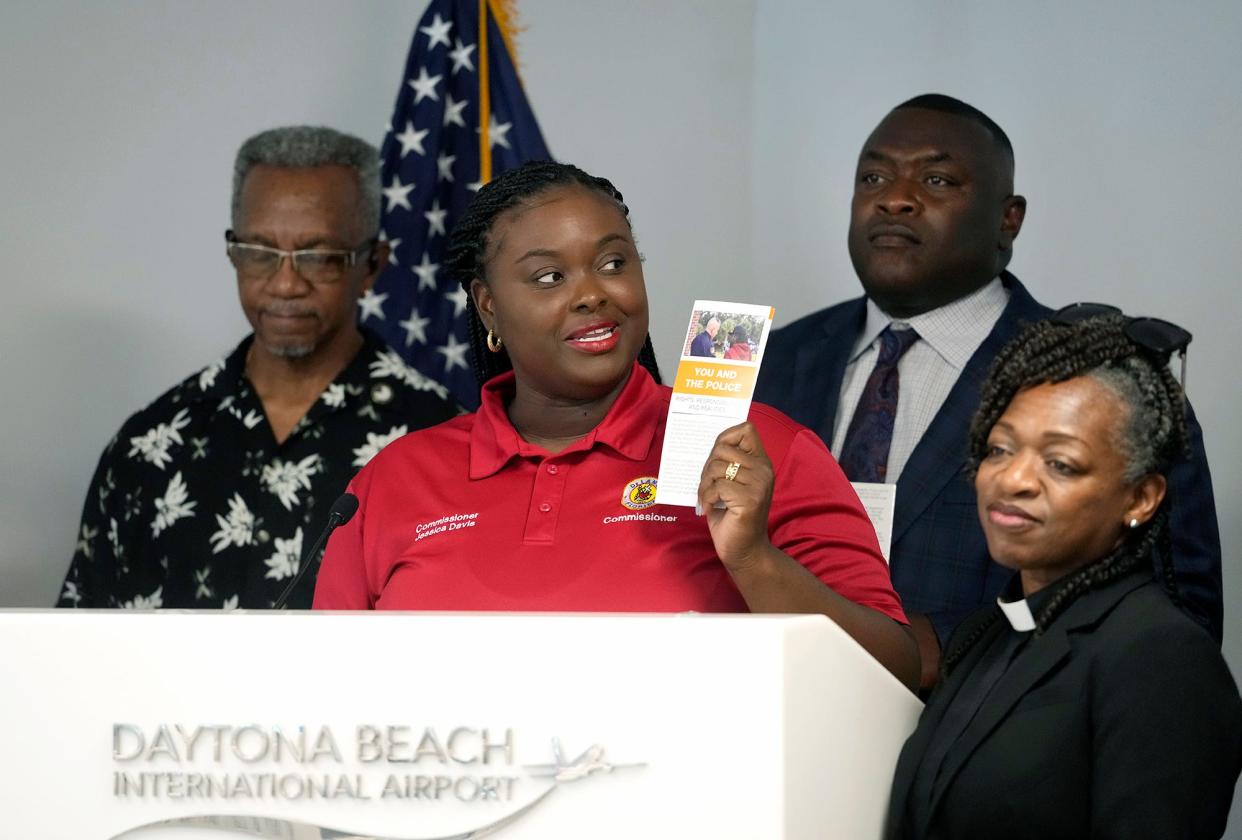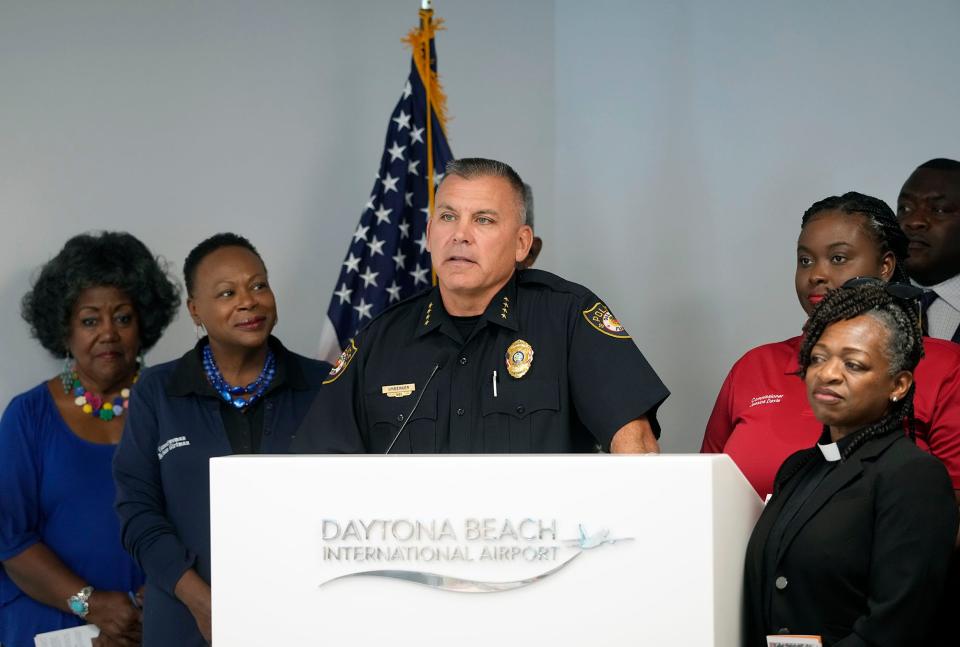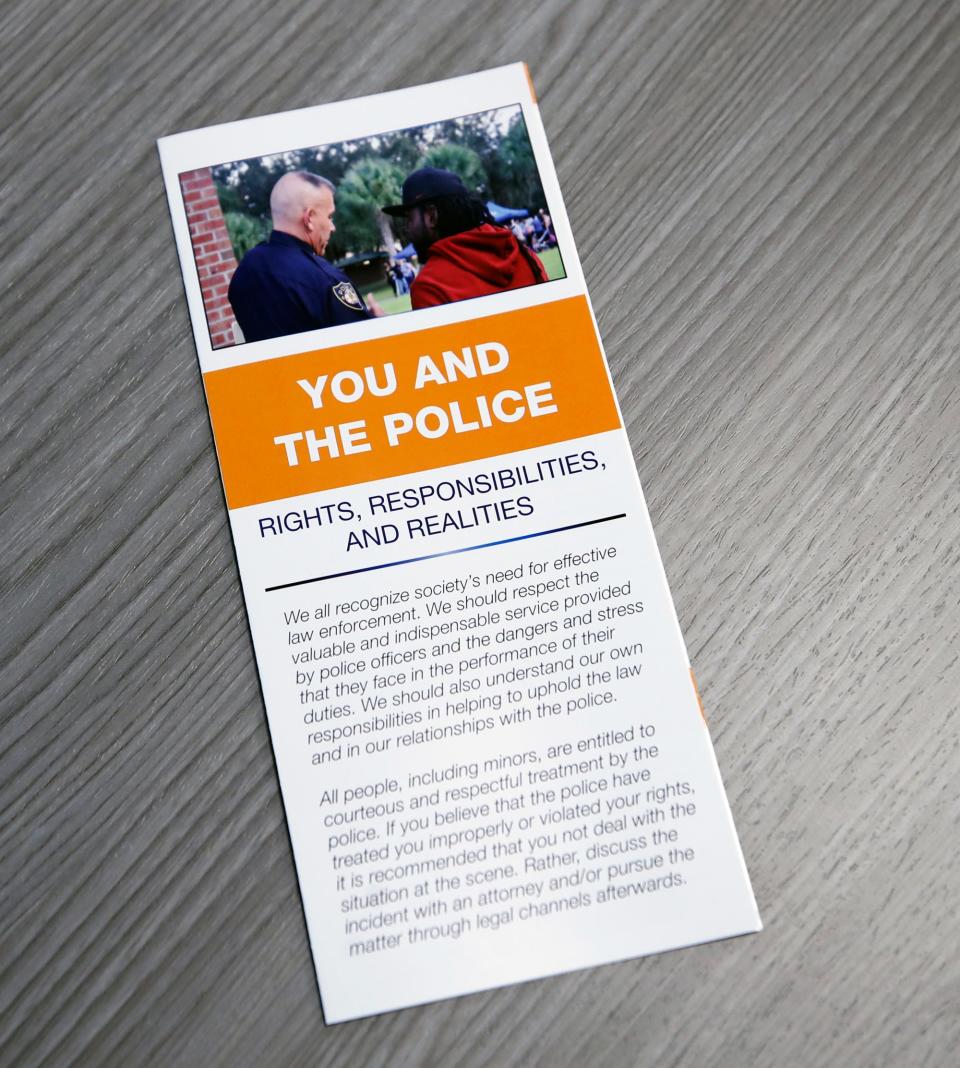Minority leaders, police gather to promote new pamphlet on better, safer interactions

What should you do if a police officer knocks on your door or you see those blue lights flashing and are stopped for a traffic violation?
Minority elected leaders and law enforcement officers joined together on Friday to announce that advice on those and other situations involving police are in a new pamphlet called: “You And The Police: Rights, Responsibilities and Realities."
Volusia County Council Vice Chairwoman Barb Girtman, who is also the vice chair for the Minority Elected Officials of Volusia County, said she hopes the information leads to smoother encounters between law enforcement and the public.
“You can tell by the group here today that the community is behind this, is connected to it. And we're making a great collaboration across our county to keep our community safe,” Girtman said.
Mario Davis, the executive director of the Minority Elected Officials, said 50,000 of the pamphlets have been printed and that officers will have them in their vehicles and copies will be distributed through churches, community organizations and political parties, with local Republicans and Democrats each receiving 2,000.
The pamphlet has been in the works for at least two years.
The information contained in the pamphlet could keep the area out of the news, said DeLand City Commissioner Jessica Davis, who is a charter member and secretary of the Minority Elected Officials of Volusia County.
“This pamphlet will not completely stop police brutality or stop a combative situation,” Davis said. “But our hope here in Volusia County is that we can do our part to not be the next big news story because of a senseless and preventative violent crime."
She said the pamphlet contained do's and don'ts, but a good start would be to keep several things in mind.
Attracting minority police: Law enforcement agencies in Volusia-Flagler struggle to attract African-American officers
Building Trust: DeLand police, minority students role play to build trust, answer difficult questions
“No. 1 is always be polite and respectful. Never badmouth a police officer. No. 2, stay calm. Control what you say as well as your body language and emotions. No.3, do not get into an argument with the police,” Davis said, such as arguing your case during a traffic stop.
“Do not try to have a courtroom discussion on the side of the road,” she added.
“And most importantly, we want the public to be equipped with de-escalation strategies, so that law enforcement personnel and the public will live to see another day,” Davis said.
She encouraged everyone to read the pamphlet and share it with friends and family.
Volusia Sheriff’s Office Capt. Ben Yisrael, who is also S.W.A.T. commander, said the Sheriff’s Office fully supported the project.
“Here are things that family members have been sharing with their children throughout the years but not everybody has had the opportunity to hear or read these suggestions or tips that can help save your life, can help make a bad situation a good situation,” Yisrael said.

DeLand Police Chief Jason Umberger is one of the law enforcement officers pictured in the pamphlet.
Umberger said that he represented the views of the Volusia Flagler Police Chiefs Association.
“I believe the information contained in this brochure will greatly assist both citizens and police officers to have safer and more effective interactions,” Umberger said.
He said the pamphlet was community policing.
“The brochure itself is an act of community policing, because it educates the public about the basic laws and what citizens’ rights and responsibilities are under the law,” Umberger said. “While at the same time it also provides information on the requirements in the law that police officers must follow.”

He said it would help build trust.
“And last but not least, the information in the brochure hopefully leads to safer, less contentious and more effective encounters between law enforcement and the community with the goal of promoting professional police conduct and gaining citizen compliance,” Umberger said.
Another speaker was Cynthia Slater, president of the Daytona Beach branch of the NAACP.
“Today is a good day. No, today is a great day as we the Volusia County citizens joined together in unity as we seek ways to bring law enforcement and all citizens together to protect the rights of individuals and for all of us to understand the laws of the county,” Slater said.
She said she hoped the information in the pamphlet would improve encounters with police.
“By presenting this new guide on interacting with law enforcement, it is my hope that it will give every person young or old and no matter the race of a person, suggested procedures to follow if a person is stopped by law enforcement, regardless of the reason,” she said.
Here are some tips contained in 'You And The Police Rights, Responsibilities, and Realities."
If police knock and ask to enter your house, politely ask for their reason. You do not have to admit them unless they have a warrant signed by a judge or if it’s an emergency situation. In such emergency, such as someone screaming for help inside or when officers are chasing someone, police can enter your home and briefly search it without a warrant.
If police insist on entering without a warrant, request the officers’ names and identification numbers and why they want to enter. “Otherwise, stay out of the way.”
If you are arrested, you have the right to remain silent and speak to a lawyer before you answer questions from police officers. Police officers are not required to read Miranda warning to you, such as the warning that you have the right to remain silent, unless they are going to ask you questions.
Police can stop and question you if they have a reasonable suspicion, you have committed a traffic violation or violated another law. In such a stop, police are allowed to “pat-down” your clothing to check for concealed weapons if they have a reasonable suspicion that you are armed. Do not physically resist.
Show your driver’s license and registration upon request. Police can search the passenger compartment of your car if they have probable cause there is evidence of a crime in the vehicle. But they cannot search further without a warrant.
If you are given a citation, you should sign it. Otherwise, you could be arrested. Signing a citation shows you received it. Signing a citation is not an admission of guilt.
You do not have to consent to a search and if you don’t consent, make sure you tell that to police. If you do consent, it may affect your rights later in court.
It is not recommended to “bad mouth” or criticize a police officer, even if it may be legally protected speech. What you say can be used against you and could cause an officer to arrest you.
Do not get into an argument with police.
“Even though refusing to answer questions is not a crime in of itself, it can make the police suspicious about you and potentially lead to a charge depending on the circumstances. Remember, anything you say can be used against you.”
Don’t run.
Don’t touch a police officer.
Don’t resist even if you are innocent.
Don’t interfere when an officer is doing his or her job.
If you believe you are the victim of police misconduct, remember the officer’s name, identification number or patrol car number. Write down what happened as soon as you can and try to find witnesses. If you were injured, take photos of the injuries, seek medical attention and tell the doctor what happened.
File a written complaint with the department’s internal affairs division.
You can also get more help by contacting the ACLU, the NAACP and or a private attorney.
This article originally appeared on The Daytona Beach News-Journal: Minority leaders, police promote pamphlet on better relations

